Warm weather, succulent cuisine, and beautiful beaches await those who travel to Durban. This vibrant city is the third largest in South Africa and offers travellers a warm-hearted experience. Known locally as Durbs or eThekwini, Durban is the proud home of many cultures and religions that mingle and live shoulder-to-shoulder in an ultra-modern city. Situated on the east coast of South Africa, Durban's ocean currents flow from the warm Indian Ocean.
Durban is home to over 595,000 people who live in its 2,292 km2 area. Located in KwaZulu-Natal province, it's considered to be among the most popular cities in South Africa, alongside Cape Town and Johannesburg.
Must-know facts about Durban
Currency: Rand (ZAR)
Official language (percentage spoken): English (49%), Zulu (33.1%), Xhosa (5.9%), Afrikaans (3.6%), and other (7.6%)
Province: KwaZulu-Natal
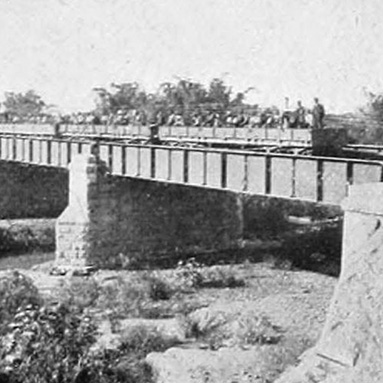
Evidence brought forward by archaeologists suggests that hunter-gatherers inhabited the Durban area around 100,000 BCE. They lived in the region until the famous Bantu farmers, who originated from the northern regions, started their slow but gradual displacement into the area.
The first recorded European sighting of KwaZulu-Natal was in 1497 when Vasco da Gama, the famed Portuguese explorer, sailed past the region and documented it. European settlers arrived around 1822 when James King, the captain of the Salisbury ship, engaged in battle near the Cape region. Upon the return trip, their ship was caught in a terrible storm and they anchored on the coast of KwaZulu-Natal. The then-ruler of the region, King Shaka Zulu of the Zulu tribe, was approached and befriended by the Europeans. He allowed the foreigners to settle and development of a city commenced.
Phansi Museum in Berea houses an amazing collection of Southern African tribal artefacts, from carved statues to fertility dolls. Bookings are essential as the museum is highly popular with art lovers.
The Temple of Understanding in Chatsworth is the largest Hare Krishna temple in the southern hemisphere. Experience this temple's magical charm or visit the lovely vegetarian restaurant located on the premises.
Gandhi Settlement is the actual house where Mahatma Gandhi lived during apartheid. The house operates as a museum dedicated to his work and that of anti-apartheid fighters. It's situated just outside the Phoenix township.
The Durban Botanical Gardens is a beautiful 2,000 sq-metre landscape featuring various plants, including the rare Encephalartos Woodii cycads and the bromeliad. Stroll through the gardens and experience South Africa's breathtaking natural scenery first-hand.
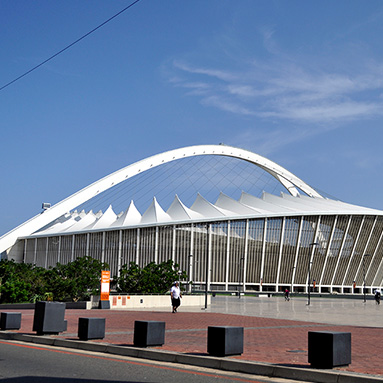
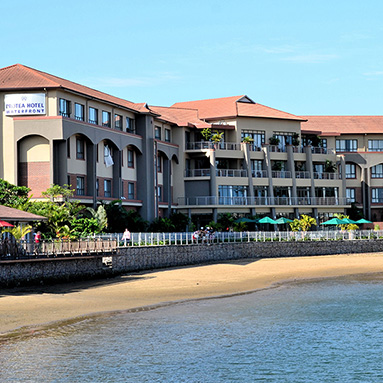
Durban is typically South African, meaning it's a conflicting mixture of modern facilities and underdevelopment. The city offers an array of accommodation options for visitors, from luxurious five-star hotels to affordable rooms to rent. Accommodation platforms serve the area and are highly popular in the region, with varying price ranges.
Compare the various accommodation options using the hippo.co.za comparison tool to see which places will offer you the best deal and value for money.
uShaka Marine World is South Africa's largest aquatic zoo and houses a large collection of magnificent sea creatures, from friendly penguins to the feared great white shark.
Tip: Aquatic shows are scheduled beforehand and showtimes can be viewed online. Make sure to book your seat before the show you'd like to see is sold out.
Moses Mabhida Stadium offers entertainment in the form of concerts and events, such as the popular Top Gear festival. If you want a thrill, challenge your nerves in one of the largest swings on earth, suspended from the stadium's arch.
Due to the warm ocean waters, Durban is a popular surfing spot for locals and even hosts international surfing events. Join renowned surfers, catch some waves, and work on your surfing skills at the Bay of Plenty, a Blue Flag beach which forms part of a stretch of beachfront known as the Golden Mile of Durban. It's popular with sports enthusiasts, surfers, and sunbathers for good reason.
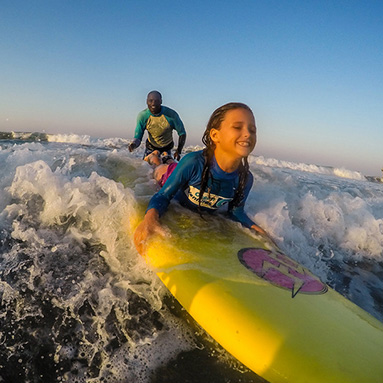
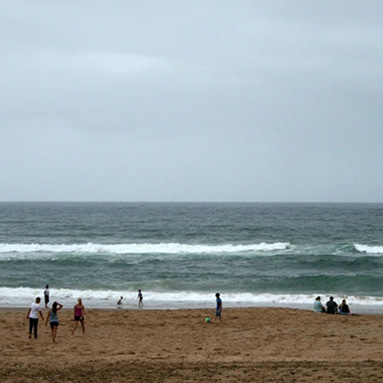
Don't forget to pack your shorts and flip-flops because Durban is known for its lovely summer-like weather all year-round. Humid summers pair well with dry and pleasant winters with little-to-no snow in sight. Rainfall occurs mostly during summer, with an annual average rainfall of over 1,000 millimetres.
Average temperatures range from 24 °C in the summer to 17 °C in the winter. The year-round warm weather makes Durban a popular holiday destination, especially for visitors from colder countries and climates like those experienced in Europe.
Tip: With great holiday weather comes high humidity. Ensure you always keep water at hand and wear breathable fabrics so your body doesn't struggle in the hot and humid conditions.
Durban is a melting pot of cultures and flavours, resulting in a great range of culinary options for visitors. From fine dining to food trucks, there is something for everyone. If you're brave enough, you can tackle the hot and spicy foods that many locals enjoy.
Popular fast-food chains, such as McDonalds, KFC, and Burger King, are available in the region. If you want to sit down and experience some traditional cuisine, head to one of the city's many Indian restaurants for a real treat. You can indulge in the tasty, spicy foods on offer, with curry and wraps being favourites among locals. All visitors should delight in a bunny chow, a traditional food that consists of half-a-loaf of bread filled with a delicious meat (not bunny) or vegetable curry.
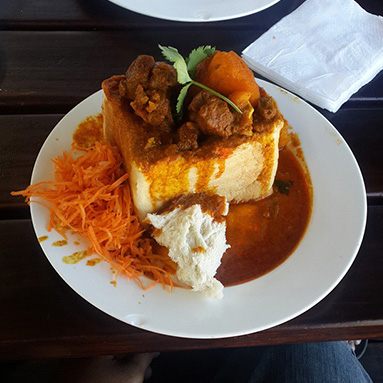
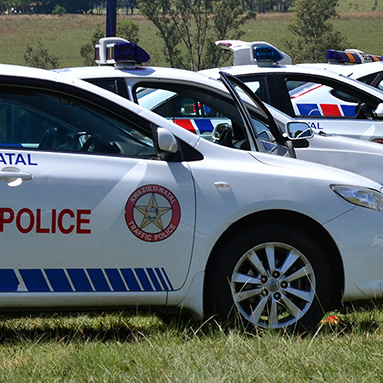
Crime is a concern in the region, with Durban listed in the World Atlas top 50 most dangerous cities in the world.
Tip: Always travel in a group. Make sure someone else knows your location and destination at all times. Saving the local police contact details on a working mobile phone is also advisable, along with sticking to regions which are considered safe for tourists. A knowledgeable tour guide can assist you with where to go and where to avoid.
Here are the various ways you can get to and around in Durban:
The roads in Durban can offer a few surprises, such as potholes and broken streetlights, but the road network is considered good. You can rent a car in Durban from one of the many car rental agencies located near major points of interest such as airports and train stations.
Durban overlooks the Indian Ocean and welcomes travellers in cruise ships from all over the world. You can book a cruise from Durban or spend time lounging on a yacht floating near the harbour, enjoying sundowners.
There are a few airports located in Durban, with King Shaka International Airport being the busiest. Most main operators offer daily flights to and from this new and modern airport.
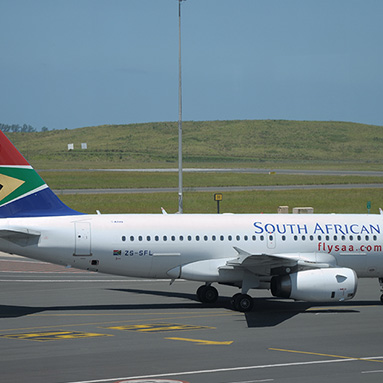
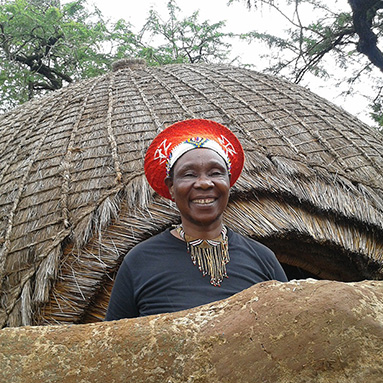
The hot and humid weather can leave you dehydrated. Make sure you always carry a bottle of water wherever you go.
Like the rest of South Africa, Durban is famous for its mixture of languages. English is commonly spoken in the region but don't let that stop you from learning some key phrases in the other common languages there.
If you're a keen surfer, the local radio stations report the tides and waves. Keep your ear tuned in to find the best surfing spots for the day.
Prices quoted are correct at the time of publishing this article. The information in this article is provided for informational purposes only and should not be construed as financial, legal, or medical advice.
Sources: Wikipedia, LonelyPlanet